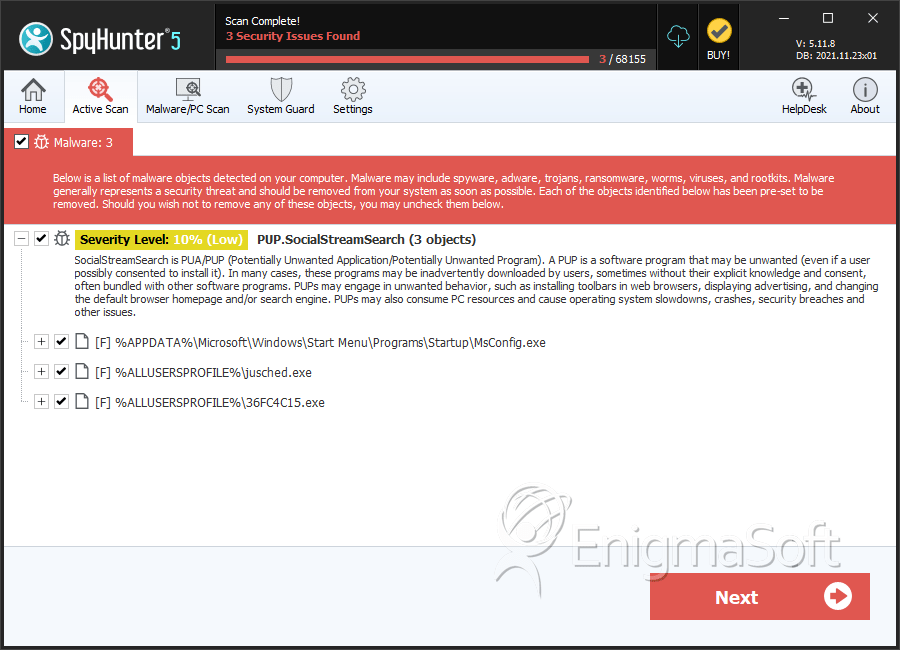Mal/Behav-130
Threat Scorecard
EnigmaSoft Threat Scorecard
EnigmaSoft Threat Scorecards are assessment reports for different malware threats which have been collected and analyzed by our research team. EnigmaSoft Threat Scorecards evaluate and rank threats using several metrics including real-world and potential risk factors, trends, frequency, prevalence, and persistence. EnigmaSoft Threat Scorecards are updated regularly based on our research data and metrics and are useful for a wide range of computer users, from end users seeking solutions to remove malware from their systems to security experts analyzing threats.
EnigmaSoft Threat Scorecards display a variety of useful information, including:
Ranking: The ranking of a particular threat in EnigmaSoft’s Threat Database.
Severity Level: The determined severity level of an object, represented numerically, based on our risk modeling process and research, as explained in our Threat Assessment Criteria.
Infected Computers: The number of confirmed and suspected cases of a particular threat detected on infected computers as reported by SpyHunter.
See also Threat Assessment Criteria.
| Threat Level: | 10 % (Normal) |
| Infected Computers: | 96 |
| First Seen: | January 10, 2012 |
| Last Seen: | February 3, 2023 |
| OS(es) Affected: | Windows |
The Mal/Behav-130 Trojan infection establishes a backdoor into the victim's computer system. Much like an open back door can allow a robber to enter an unguarded house, a backdoor into a computer system is a hole in the computer's security environment which grants a criminal access from a remote location. Using Mal/Behav-130, criminals can install other software on the victim's computer system, steal information or control the infected computer from afar. Mal/Behav-130 is thought to originate in Brazil due to Portuguese fragments in this malware infection's code and the fact that Mal/Behav-130 attempts to connect to websites and servers located in that country. Mal/Behav-130 has been closely linked to banking Trojans designed to steal bank account information and credit card information. Mal/Behav-130 will usually be the first step in a large-scale malware attack with the intention of stealing the victim's money and online banking information. ESG security researchers consider that Mal/Behav-130 is a severe threat to a computer system. Any signs of a Mal/Behav-130 Trojan infection require immediate action, usually in the form of an in-depth scan of all hard drives and external memory devices on the victim's computer system. It is also important to mention that measures should be taken to ensure that bank accounts and credit cards of the victim have not been compromised, in the event of a Mal/Behav-130 Trojan infection.
Table of Contents
Protecting Your Computer System from Mal/Behav-130
Because Mal/Behav-130 is a Trojan infection, Mal/Behav-130 cannot spread on its own. Trojans will usually depend on other malware infections which in turn will typically use social engineering and deception in order to infect the victim's computer system. Mal/Behav-130 in particular is typically spread through malicious file attachments contained in unsolicited email messages. These file attachments will usually be disguised. When the victim opens the attachment, an error message will pop up, claiming that there was an error in the file. Inexperienced computer users may forget about the file without realizing that this fake error message is designed to distract from the fact that the attachment was really a dropper Trojan. Once installed on the victim's computer, Mal/Behav-130 then proceeds to open up various ports and establish a connection with a remote server located in Brazil. From there, a criminal can install various other malware infections on the victim's computer.
Aliases
15 security vendors flagged this file as malicious.
| Anti-Virus Software | Detection |
|---|---|
| ClamAV | Win.Trojan.Agent-236684 |
| AVG | Delf.AIPG |
| Ikarus | Trojan-Dropper.Delf |
| McAfee-GW-Edition | Heuristic.LooksLike.Win32.Suspicious.J!89 |
| TrendMicro | TROJ_GEN.R11Z4LC |
| AntiVir | TR/Spy.Banker.Gen |
| Comodo | TrojWare.Win32.Spy.Banker.Gen |
| Kaspersky | HEUR:Trojan.Win32.Generic |
| Avast | Win32:WrongInf-G [Susp] |
| Symantec | WS.Reputation.1 |
| F-Prot | W32/SysVenFak.A.gen!Eldorado |
| K7AntiVirus | Trojan |
| McAfee | Artemis!81D9CACB268F |
| AVG | Downloader.Generic13.IEE |
| Fortinet | Malware_fam.NB |
SpyHunter Detects & Remove Mal/Behav-130

File System Details
| # | File Name | MD5 |
Detections
Detections: The number of confirmed and suspected cases of a particular threat detected on
infected computers as reported by SpyHunter.
|
|---|---|---|---|
| 1. | MsConfig.exe | 81d9cacb268fe200dc26857cdb821f24 | 88 |
| 2. | jusched.exe | 14544132f739dd9c853845aa5e44a954 | 5 |
| 3. | 36FC4C15.exe | b0115f9b0e093c1b144bd90d1de79c6d | 2 |
URLs
Mal/Behav-130 may call the following URLs:
| smartsportsearch.com |


Submit Comment
Please DO NOT use this comment system for support or billing questions. For SpyHunter technical support requests, please contact our technical support team directly by opening a customer support ticket via your SpyHunter. For billing issues, please refer to our "Billing Questions or Problems?" page. For general inquiries (complaints, legal, press, marketing, copyright), visit our "Inquiries and Feedback" page.